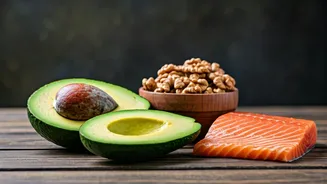Protein Powerhouses
Protein forms the fundamental structure of your hair, rendering it vital for its health and growth. When there's a lack of protein in your diet, hair can
become thin, brittle, and its growth might slow down. Incorporating protein-rich foods into your meals is essential. Excellent sources include lean meats like chicken and turkey, which are packed with protein. Additionally, fish such as salmon offers a double benefit, providing both protein and omega-3 fatty acids, which nourish the scalp and stimulate hair growth. Eggs are another great option; they are not only rich in protein but also in biotin, a B vitamin known to support hair health. Including these sources regularly ensures the body has the necessary building blocks for strong, vibrant hair. Ensure you have a balanced intake of these foods, varying the choices to ensure you're getting a range of essential amino acids and nutrients crucial for your hair's overall well-being. A diet lacking in protein can severely impact your hair's health, so prioritize protein-rich foods to maintain its strength and beauty.
Omega-3 Fatty Acids
Omega-3 fatty acids are critical for maintaining the health of your scalp and boosting hair growth. These essential fats offer anti-inflammatory properties that can soothe the scalp and promote optimal conditions for hair growth. Foods rich in omega-3s include fatty fish like salmon, which is not only a fantastic source of protein but also provides beneficial oils that support hair health. Flaxseeds and chia seeds are plant-based options that are also packed with omega-3s, allowing you to incorporate these nutrients if you follow a vegetarian or vegan lifestyle. Nuts such as walnuts also contain omega-3s, along with other essential nutrients that contribute to hair strength. Consuming omega-3 rich foods ensures the scalp remains healthy and well-nourished, which in turn encourages healthier hair growth. The inclusion of omega-3s in your diet not only contributes to the health of your hair but also enhances the overall condition of your scalp.
Iron for Strength
Iron is crucial for delivering oxygen to the hair follicles, supporting growth and preventing hair loss. Iron deficiency can lead to anemia, a condition often associated with hair thinning and a lack of vitality. To combat this, it’s vital to incorporate iron-rich foods into your diet. Lean red meats are excellent sources of iron, providing readily absorbable heme iron. Dark leafy greens, like spinach, offer non-heme iron, which can be absorbed if consumed with vitamin C-rich foods. Legumes, such as lentils and beans, are also rich in iron, offering a plant-based option for those seeking alternative sources. The consistent intake of iron-rich foods ensures that your hair follicles get adequate oxygen, which promotes stronger, healthier hair. Ensuring sufficient iron levels not only helps maintain hair growth but also improves overall well-being. Consuming foods rich in vitamin C alongside iron sources can substantially enhance the body's iron absorption, improving its effectiveness.
Zinc's Vital Role
Zinc is another key nutrient for healthy hair, playing a crucial role in hair tissue growth and repair. It helps to keep the oil glands around the hair follicles working properly. A deficiency in zinc can result in hair loss and a dry, flaky scalp. To ensure adequate zinc intake, incorporate zinc-rich foods into your diet. Nuts, like cashews, are a good source, providing both zinc and other beneficial nutrients. Eggs also contain zinc, making them a beneficial addition to your meals. Whole grains offer zinc along with other essential minerals and fiber, supporting overall health. Including zinc-rich foods in your diet ensures that your hair follicles are supported, promoting growth and preventing issues such as hair loss and scalp dryness. Maintaining adequate zinc levels is essential to promote healthy hair growth and prevent issues associated with its deficiency.
Vitamins for Hair
Vitamins, particularly the B vitamins, are fundamental to hair health, supporting various processes that are crucial for growth and strength. Biotin, a B vitamin, is often highlighted for its role in enhancing hair health, promoting growth and reducing brittleness. Foods like eggs, nuts, and seeds are good sources of biotin. Other B vitamins, such as riboflavin and niacin, also contribute to the overall health of hair, assisting in cellular processes and scalp health. Vitamin C aids in collagen production, vital for hair structure and strength, while also acting as an antioxidant. Foods rich in vitamin C, such as citrus fruits and berries, should be part of the diet. Vitamin D also plays a role in hair follicle cycling, with deficiencies linked to hair loss; including vitamin D-rich foods or supplementing under medical guidance can be beneficial. A diet rich in vitamins supports the complex processes needed for healthy hair growth, providing it with the necessary nutrients for its health and vitality.
Hydration's Importance
Proper hydration is a foundational element for maintaining healthy hair, often overlooked but critical for overall wellness. Drinking enough water supports the body's internal functions, including those that influence hair health. Dehydration can lead to dry, brittle hair, making it more prone to breakage and damage. Aim to drink an adequate amount of water throughout the day to keep your hair hydrated from the inside out. Alongside drinking water, consuming water-rich foods, such as fruits and vegetables, can also contribute to your overall hydration levels. These include cucumbers, watermelons, and leafy greens. Proper hydration provides the necessary moisture to the hair follicles and scalp, supporting hair elasticity and shine. By prioritizing hydration, you're not just improving the overall health of your hair but also promoting overall health and well-being. Proper hydration helps maintain the balance of moisture required for healthy, vibrant hair.















